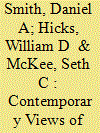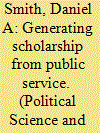| Srl | Item |
| 1 |
ID:
177213


|
|
|
|
|
| Summary/Abstract |
What are Americans’ views on liberal democracy? Have their attitudes changed since the 1950s? How do their attitudes about liberal democracy shape political behavior, such as vote choice? We replicated McClosky’s (1964) seminal study on a module to the 2016 Cooperative Congressional Election Study. Our exploration of 26 survey questions reveals both continuity and change in Americans’ attitudes toward liberal democracy. Whereas Americans have become more hostile toward some standard democratic procedural rules of the game, we also find that they harbor more tolerant attitudes toward racial and ethnic equality. We subjected respondents’ answers to an exploratory factor analysis, which reveals three distinct dimensions regarding democratic values: elitism, authoritarianism, and racial supremacy. We find that elitism and racial supremacy significantly influenced political behavior in the 2016 presidential election and note that these factors contributed to mass unrest in 2020, exposing fault lines deeply rooted in America’s contentious political history.
|
|
|
|
|
|
|
|
|
|
|
|
|
|
|
|
| 2 |
ID:
105376


|
|
|
|
|
| Publication |
2011.
|
| Summary/Abstract |
Most colleges and universities stipulate that public service is a requirement for tenure and promotion. Yet many political science faculty and their respective administrators pay only lip service to this "third leg" of a scholarly career, relying on teaching and research to shape most career decisions. This reality is particularly surprising in the context of the political science discipline, given that the nature of our scholarship provides many public service opportunities. However, the norms and pressures of academia in general are at play. Why, then, should political scientists engage in public service, much less become serious "pracademics"?
|
|
|
|
|
|
|
|
|
|
|
|
|
|
|
|